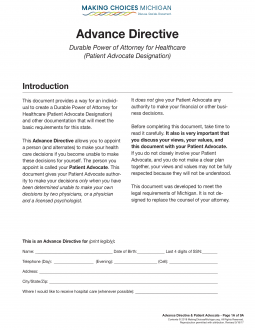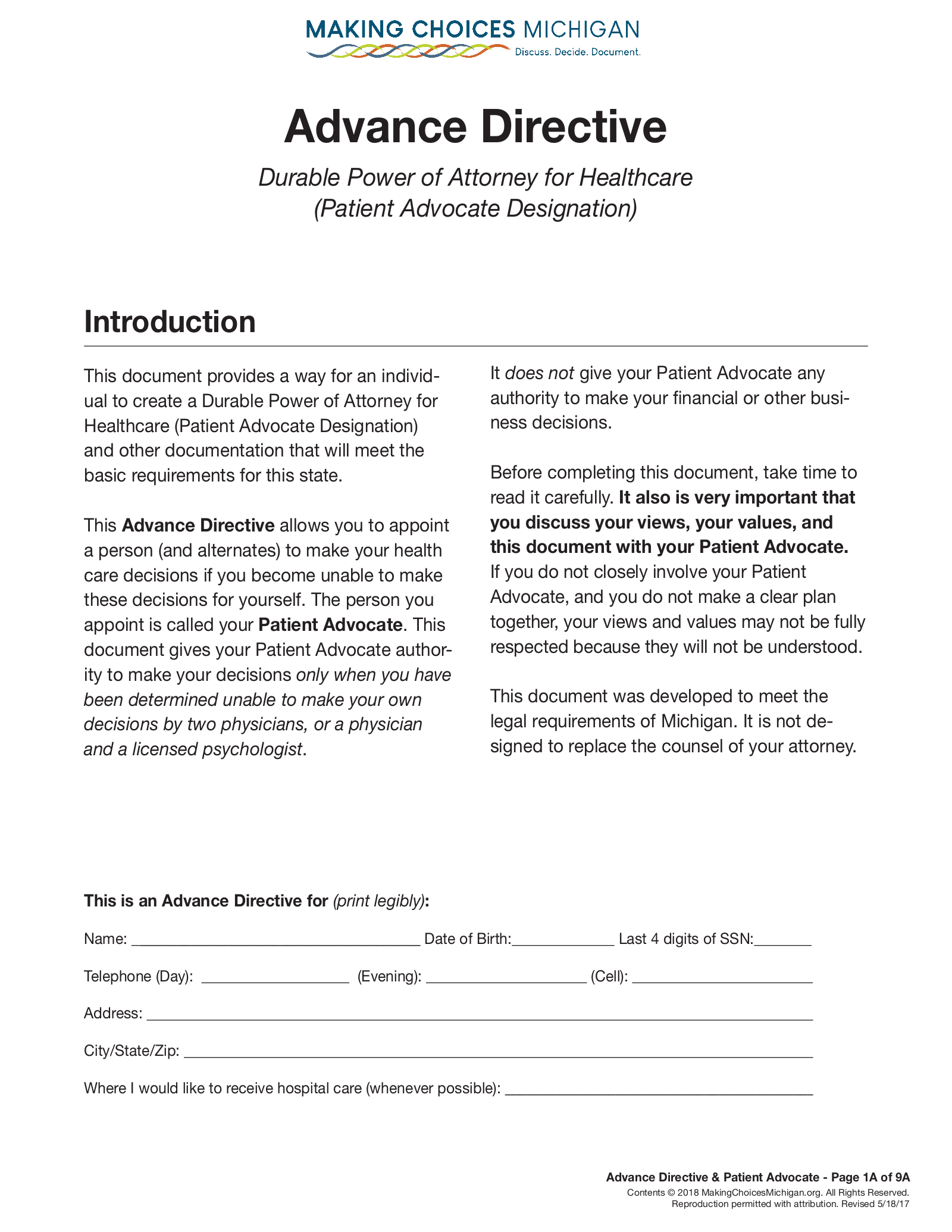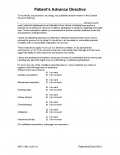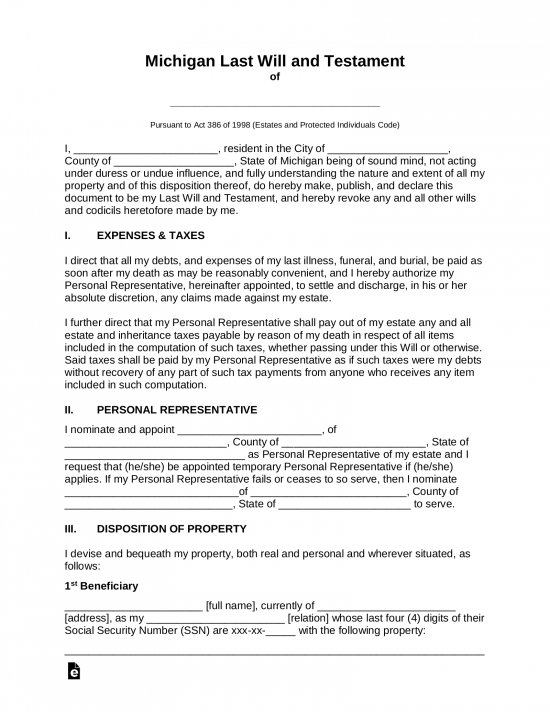Updated July 27, 2023
A Michigan advance directive is a document that lets a person select and articulate end-of-life treatment options and can be used to determine medical decisions in the chance they become unable to speak for themselves. This includes an agent that can be nominated to make health care decisions on the person’s behalf in addition to treatment options and organ donation selections. After completing and signing with at least two (2) witnesses, it can be used in the event the patient becomes incapacitated.
Advance Directive Includes
Table of Contents |
Laws
Statute – § 700.5501 to § 700.5520[1] & § 333.5651 to § 333.5661[2]
Signing Requirements – Two witnesses.[3]
Versions (9)
- AARP
- ALWR
- Blue Cross / Blue Shield
- Helen Newberry Joy Hospital
- Henry Ford
- Making Choices
- Michigan.gov
- Spanish (Español) Version
- University of Michigan
Download: PDF
Download: PDF
Download: PDF
Download: PDF
Download: PDF
Download: PDF
Download: PDF
Download: PDF
Download: PDF
How to Write
Download: PDF
Identify the Michigan Principal
(1) Michigan Patient or Principal Name. Identify yourself as the Michigan Principal seeking to convey his or her treatment decisions to Physicians in this state by appointing a Party to speak on your behalf.
(2) Supporting Principal Information. Michigan Medical Personnel will need to verify your identity by matching it with some additional information that is unique to you. Thus, present the date of your birthday and the last four digits of your social security number
(3) Principal Contact Phone Numbers.
(4) Michigan Principal’s Address.
(5) Preferred Medical Care Facility. If you currently receive medical care with a Hospital or similar Facility, then record its name to the space provided. Otherwise, if not currently hospitalized, document the name of the Hospital or Medical Facility you prefer to receive treatment or care if a need for hospitalization must be met.
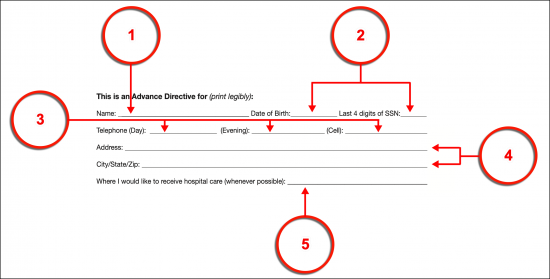
Michigan Patient Advocate
(6) Name Of Patient Advocate. After you have provided your information, report the full name of the Party you are authorizing to be your Patient Advocate. You will also need his or her contact information for this section.
(7) Patient Advocate Relationship To Principal. The Michigan Patient Advocate’s relationship to you is expected to support his or her identity. Produce how the Michigan Patient Advocate is related to you on the blank line provided.
(8) Telephone Numbers.
(9) Patient Advocate Address.
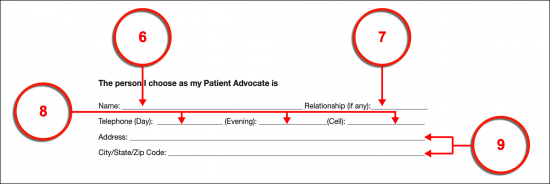
First Alternate (Successor) Patient Advocate
(10) Name of First Alternate Patient Advocate. It is generally a good idea to make sure that you will have a Patient Advocate to speak to Michigan Doctors attending to your care when you are unable to do so. Therefore, an Alternate Michigan Agent should be set up in consideration of a scenario where your currently named Patient Advocate is unable or unwilling to speak to Michigan Doctors on your behalf. Name your Alternate Michigan Agent to this role using the area provided. It should be mentioned the Alternate Agent named will only take on the Patient Advocate role should your original choice leave this position vacant.
(11) First Alternate Advocate Relationship To Principal.
(12) Phone Numbers Of Successor Patient Advocate.
(13) Address Of Successor Patient Advocate.
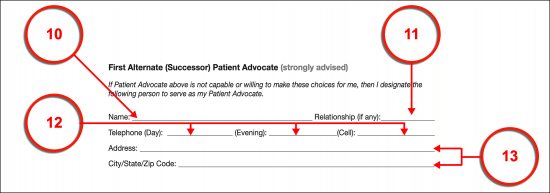
Second Alternate (Successor) Patient Advocate
(14) Second Alternate (Successor) Patient Advocate Name. You can authorize a Second Alternate Agent through this paperwork in case neither of your previously named Agents has the ability or authorization to represent you. The Second Alternate Agent will only have the power to act as your Michigan Patient Advocate should this position be vacant, you need medical care, and you cannot speak for yourself.
(15) Relationship Of Second Alternate Advocate To Principal.
(16) Telephone Number(s) Of Second Alternate Patient Advocate.
(17) Address Of Second Alternate Patient Advocate.
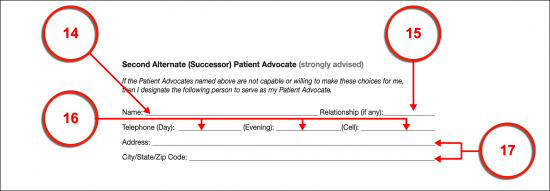
Advance Directive Signature Page
(18) Direct Approval Of Patient Advocate Instruction. The Michigan Patient Advocate will need additional approval to pursue any direction you issue requiring that he or she deny or withhold life support equipment and life-prolonging procedures needed to keep you alive. Select the statement delivering this authorization to grant your Michigan Patient Advocate the power to make such a decision on your behalf.

Signature Of the Individual In The Presence Of the Following Witnesses
(19) Signature Of Michigan Principal. This document must show proof that you intend for it to take effect thereby granting the Patient Advocate the power to speak for you. For this effect, you must sign your name while two Witnesses watch.
(20) Signature Date.
(21) Michigan Principal Address.
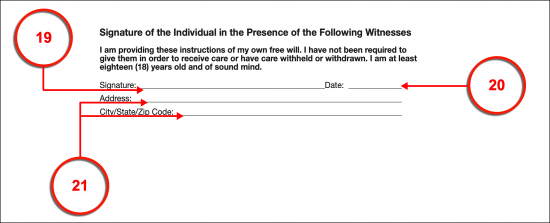
Signature Of Witnesses
(22) Witness Number 1 Signature And Date. Witness Number 1 is expected to prove that he or she meets the Michigan standards set for his or her role then sign his or her name. This signature will also show that your own signature was provided while of sound mind. The date this signature is dispensed must also be furnished by Witness 1.
(23) Witness Number 1 Information. The first Witness must dispense his or her address information after signing this form.
(24) Witness Number 2 Signature And Date. The Second Witness present at your signing will also need to sign and date this form to demonstrate that he or she is qualified to verify your signing and that your signing is completed while you are perfectly aware of your surroundings and action.
(25) Witness Number 2 Information. The full address of Witness Number 2 is also required with his or her signature and signature date.
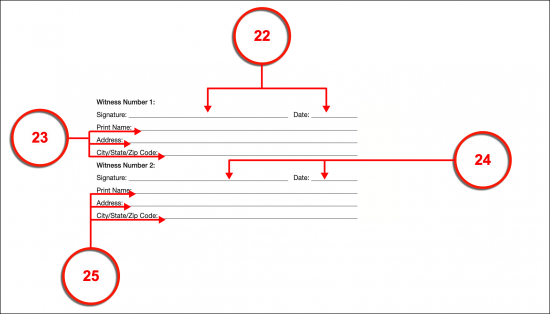
Accepting The Role Of Patient Advocate
(26) Michigan Principal’s Information. The Michigan Patient Advocate will be expected to accept his or her designation by signature. Before this can happen, some preparation must be taken. Produce your name and birth date at the top of the page.

Patient Advocate Statement
(27) Patient Advocate Name. The printed name of the Michigan Patient Advocate should be used to prepare his or her acceptance statement.
(28) Signature of Patient Advocate. Once your Michigan Patient Advocate has reviewed this document and agreed to the statement prepared above, he or she must sign his or her name as a formal acceptance of this role.
(29) Signature Date
(30) Address Of Patient Advocate.
(31) Phone Numbers.
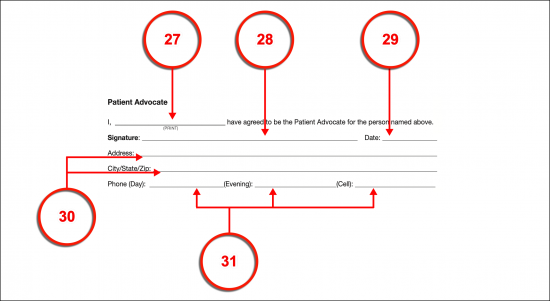
First Alternate Patient Advocate Statement
(32) First Alternate Patient Advocate Name. It is also recommended that the First Alternate Patient Advocate provide proof of his or her acceptance of this responsibility. Before this can be properly delivered, his or her full name should be produced to the First Alternate (Successor) Patient Advocate’s acceptance statement.
(33) Signature Acceptance Of First Alternate Patient Advocate. The First Alternate (Successor) Patient Advocate must sign his or her name then produce
(34) First Alternate Patient Advocate’s Signature Date.
(35) Address Of First Alternate Patient Advocate
(36) Contact Telephone Numbers.
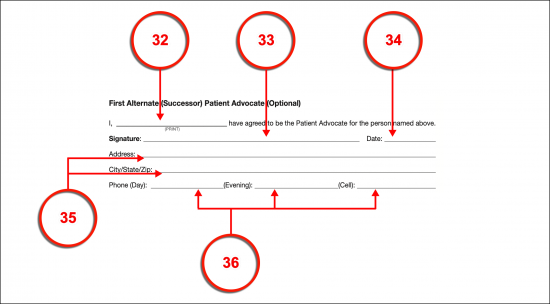
Second Alternate Patient Advocate Statement
(37) Second Alternate Advocate Name. The full name of the Second Alternate (Successor) Patient Advocate should be presented to the next acceptance statement provided.
(38) Second Alternate Advocate Signature. The signature of the Second Alternate (Successor) Patient Advocate is needed to demonstrate that he or she acknowledges and accepts the potential obligation of being your Patient Advocate.
(39) Signature Date Of Second Alternate Advocate.
(40) Address Of Second Alternate Advocate.
(41) Phone Numbers Of Second Alternate Advocate.
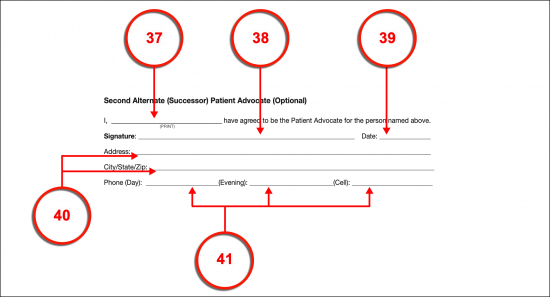
Preferences For Spiritual/Religious And End Of Life Care
(42) Religious Directive. Your spiritual or religious beliefs may prevent you from accepting an examination from Medical Professionals (i.e., a licensed Physician or Psychologist). If so, then make this declaration by marking the checkbox statement in this document’s religious directive.
(43) Religious Or Spiritual Orientation. Your religion or spiritual belief can be documented in this section.
(44) Name Of Religious Or Spiritual Organization. A space where you can record the name of the Religious or Spiritual Institution that you belong to or are familiar with has been provided.
(45) Religious Or Spiritual Leader. The name, address, and contact phone number of the Spiritual or Religious Leader of your congregation should be presented. This will enable Michigan Medical Professionals to contact the head of the religious organization you attend or are a member of.
(46) Religious Concerns. If you have any religious beliefs or practices that attending Michigan Medical Professionals should take into consideration when addressing your condition and developing a treatment plan, then discuss them in the space provided.
(47) Status Of Religious Directive. If you have intentionally left the religious directive portion of this packet unattended then initial the final statement to confirm this exclusion. Otherwise, if left unmarked, attending Medical Professionals will assume that the above sections should be observed.
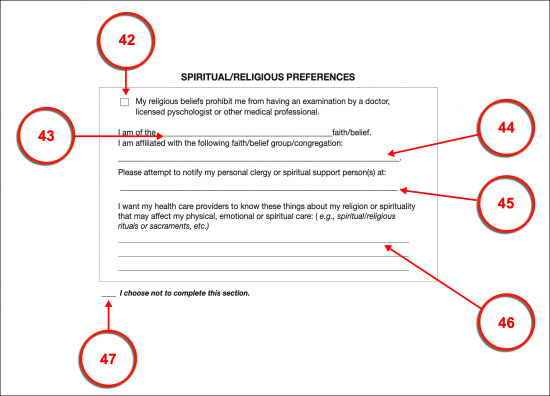
End Of Life Directive
(48) Preferred Location. You can include general or specific end-of-life instructions for Michigan Medical Professionals in charge of your care. The first section presents several options to choose from to define where you prefer your end-of-life event to occur. Use this list to indicate if you prefer to die at home, in a hospital, a hospice residence, or with hospice service, in a long-term care facility, or you can leave this decision to your Patient Advocate.

(49) Final Requests Of Michigan Declarant. Your preferences regarding the environment where you wish to spend your end-of-life event can be documented in the area provided. You can name any reasonable expectations you may have (i.e., specific music, objects, or even visitors).
(50) End Of Life Directive Status. If you do not intend to include directives on your end-of-life care, then initial the final statement of this section. This will establish that you have purposely left this area unattended.

Anatomical Gifts – Donation Of Organs/Tissue/Body
(51) Presenting As A Registered Michigan Donor. If you have already registered as an Organ Donor with the Michigan Donor Registry (with or without your Driver’s License) then initial the first statement to define your status as a Michigan Organ Donor.
(52) Deciding To Make An Anatomical Gift. If you are not currently a Registered Michigan Organ Donor but approve of your Michigan Patient Advocate’s decisions to make anatomical gifts of your body part, organs, and/or tissues (upon your death) then initial the second statement.
(53) Limiting Anatomical Gifts. If you are not a Registered Michigan Organ Donor, want to approve your Patient Advocate of arranging for anatomical donations to be made from your body, but do not authorize certain organs or tissues, then initial the third statement. This statement provides a space where you should detail all organs, tissues, or body parts that you do not authorize for an anatomical donation.
(54) Refusing To Be A Michigan Organ Donor. If you do not authorize any body parts, organs, or tissues to be donated upon death then, initial the fourth statement.
(55) Making An Anatomical Gift for Science. If you have made arrangements for your body to be donated for medical or scientific study, then initial the final statement. This statement will solidify this authorization under the assumption that the Recipient has agreed to your intended anatomical donation.
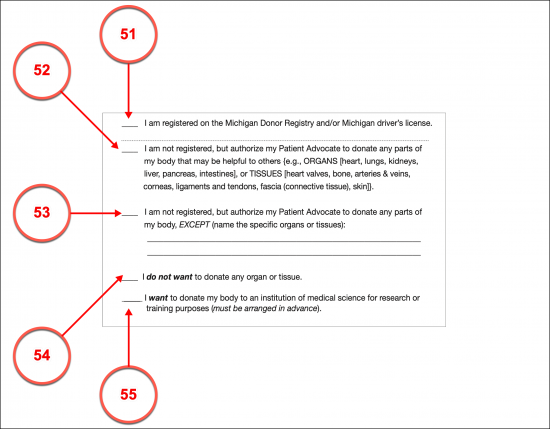
(56) Anatomical Gift Status. Michigan Medical Professionals and your Patient Advocate may seek this area of your directive when appropriate. If you have decided not to complete it then initial the statement declaring this section was left incomplete on purpose.

Autopsy Preferences
(57) Michigan Principal’s Autopsy Directive. In some cases, a private autopsy may be requested by the concerned Parties. So long as this is not mandated by the government, you may consent or refuse an autopsy performed when requested by a Private Party for the purpose of aiding your blood Relatives to come to terms with the cause of your death, for the purpose of medical education, or you can refuse any autopsy not required by the state or federal government (i.e., if foul play is suspected).
(58) Status Of Michigan Principal’s Autopsy Directive. If you do not want to issue instructions regarding a Private Party’s potential request for an autopsy, then indicate this status by initialing the appropriate declaration.
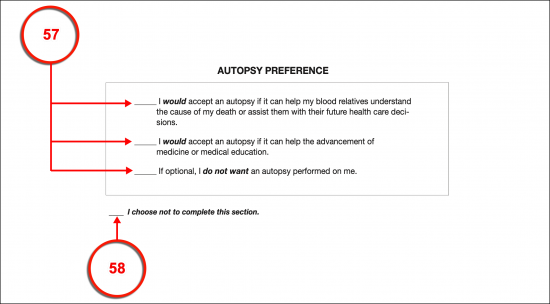
Burial/Cremation Preference
(59) Preferred Disposition Of Body. To inform your Patient Advocate, Medical Professionals, and other Concerned Parties of your preferred disposition provide your initials to directly request that burial be arranged, a cremation, a green burial, or let your next-of-kin decide this for you. There is also a statement that informs Reviewers that you have a designated Funeral Representative that should be sought. Initial the item that best defines your burial or cremation preference.
(60) Status Of Burial/Cremation Directive. If no declaration regarding your post-death preference for burial or cremation will be made here, then inform Reviewers of this by initialing the statement indicating this fact.
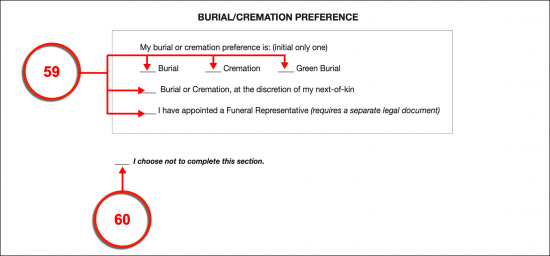
Preferences for Mental Health Examination & Treatment
(61) Preferred Diagnosing Physician. Certain statements can be made regarding your mental health care should you be rendered incapable of making decisions at a time of crisis. You can set the declaration of your incapacity or inability to make decisions to be made by a Physician or Psychiatrist of your choice by selecting the first checkbox in this section then providing his or her name.
(62) Diagnosing Physician Name.
(63) Optional Exclusion. To indicate that you have not named a diagnosing Physician or Psychiatrist of choice to declare you as incapable or incapacitated, you must initial the statement provided.
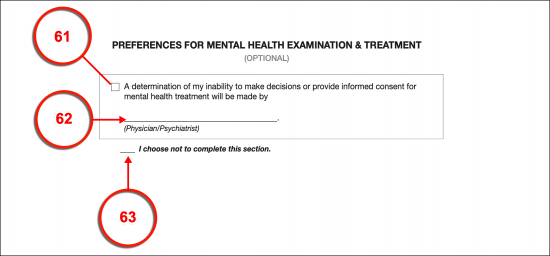
Patient Advocate’s Powers In Mental Health Care Treatment
Initial Any Or All Items To Apply
(64) Outpatient Services. If you have appointed a specific Party as your Michigan Patient Advocate, then you can give him or her the authority needed to make certain decisions over your mental health care treatment by supplying your initials next to the appropriate item. For instance, you can authorize your patient to decide upon whether you should receive outpatient therapy by attending a Mental Health Care Facility’s programs and monitoring by initialing the first item.
(65) Voluntary Admission. Initial the second item to authorize your Patient Advocate’s authority to admit you for hospitalization for the purpose of receiving mental health services and treatment as a patient. Notice you will retain the right to initiate a discharge from any such hospitalization with three days’ notice.
(66) Inpatient. If you wish to grant your Patient Advocate the principal power to admit you for inpatient mental health services, then initial the third statement.
(67) Psychotropic Medication. Your Patient Advocate can inform Michigan Physicians and Psychiatrists of which medications you consent to be administered and which you deny once you give him or her the principal power to do so by initialing the fourth statement. It is strongly recommended that your Patient Advocate is kept fully abreast of your preferences even if there is a low probability that he or she will need to represent such decisions on your behalf.
(68) Electro-Convulsive Therapy (ECT). If you wish to authorize your Patient Advocate to consent to or deny electro-convulsive therapy on your behalf, then initial the fifth statement.
(69) Waiving Immediate Revocation. Normally, your revocation of a Michigan Patient Advocate’s powers or your health care directives can be delivered orally or in writing (strongly recommended) and takes place immediately. You can declare that when in a mental health crisis where your Patient Advocate is representing your treatment preferences, that you waive the right to immediately revoke your Agent’s powers. Instead, a thirty-day waiting period from the date of revocation must elapse before your Patient Advocate’s powers and your health care directives are considered terminated. This does not remove your right to discharge yourself from a mental health facility with three days’ notice if you have indicated that you intend to retain that right. By initialing the final statement, you will only affect the time frame involved with a revocation.
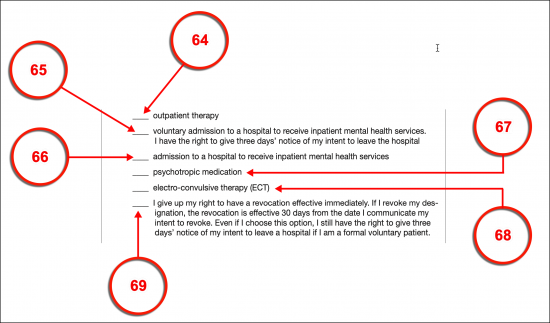
(70) Specific Instructions For Michigan Principal’s Mental Health Treatment. If you have any limitations or further instructions regarding your mental health treatment and/or the designations of power made above, then use the space provided to include these instructions and limitations.
(71) Michigan Principal’s Executing Signature. In order for your principal power regarding mental health treatment to be granted to your Michigan Patient Advocate, this section must bear your signature.
(72) Michigan Principal’s Signature Date.
(73) Mental Health directive Status. You can inform future Reviewers that you have opted out of making any mental health treatment directives by initialing the statement proclaiming as much.
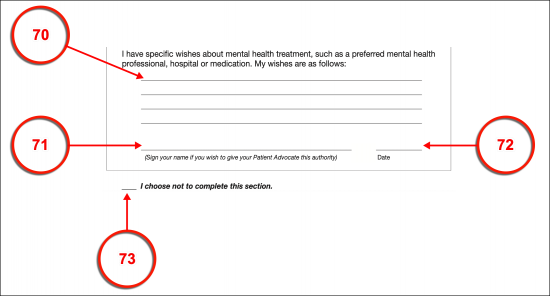
Related Forms
 Durable (Financial) Power of Attorney
Durable (Financial) Power of Attorney
Download: PDF, MS Word, OpenDocument
Download: PDF, MS Word, OpenDocument

